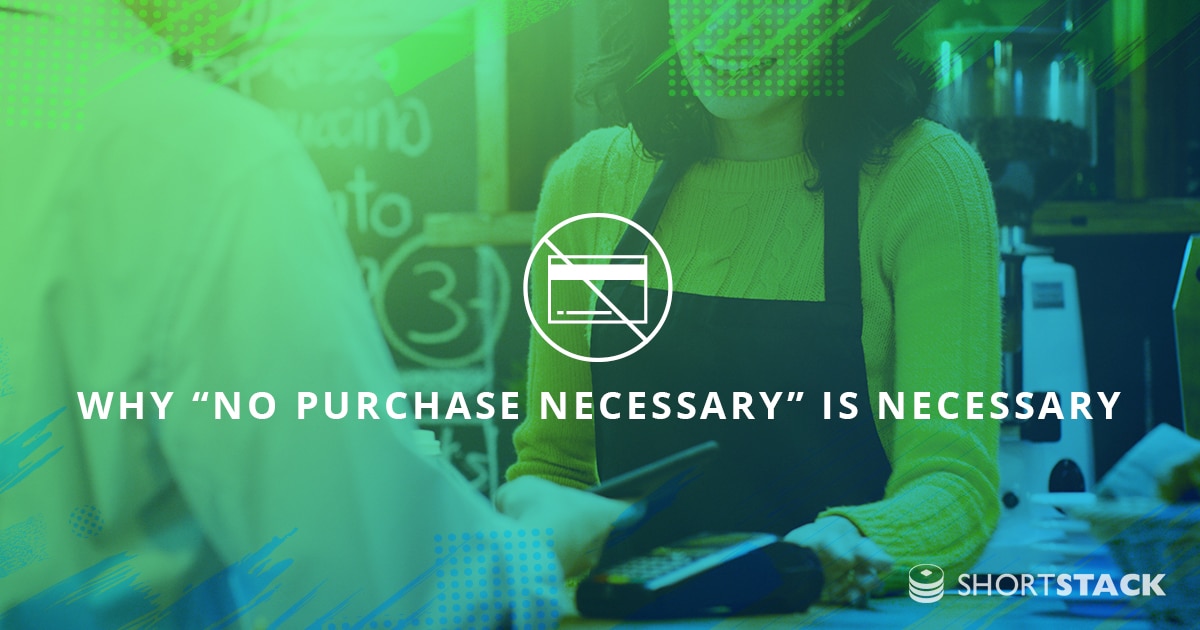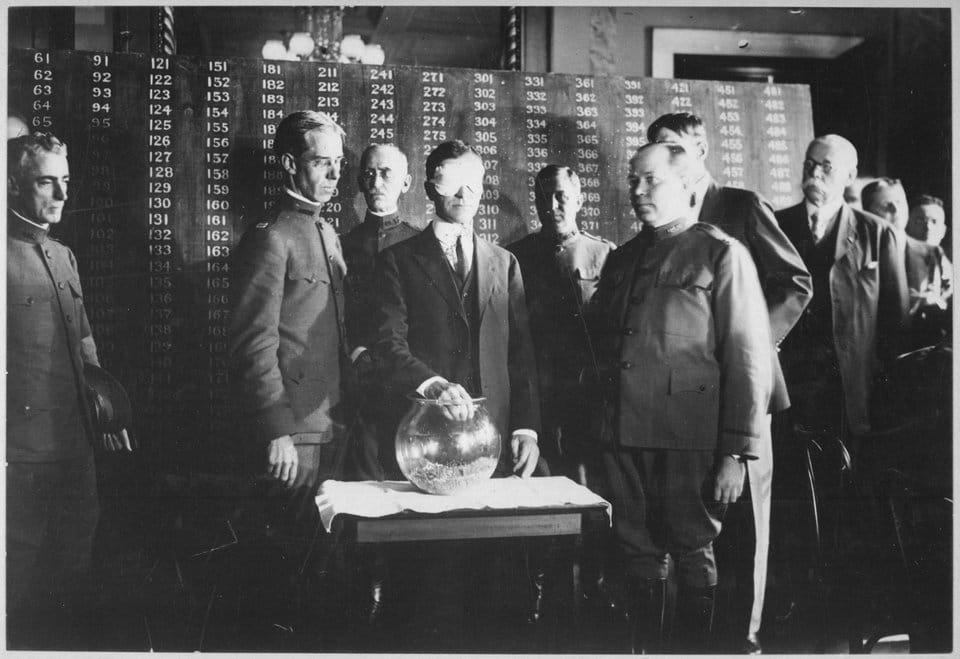Running a Giveaway? Why “No Purchase Necessary” is Necessary

Learn about the No Purchase Necessary law and how it applies to giveaways, sweepstakes, and lotteries in the US.
Even if you’re completely in the dark about laws regarding giveaways, these three words - no purchase necessary - are surely very familiar to you. You’ve heard them a million times, usually at the end of a booming television or radio ad, announcing your chance of winning fabulous prizes.If you’re new to running giveaways for your business, you may have never given the phrase “no purchase necessary” much thought until now. After all, asking for a payment or purchase to enter your giveaway is tempting, especially if you’re ponying up a really juicy prize. But whether you’re giving away a t-shirt or a new Range Rover, there’s a reason “no purchase necessary” is attached to every sweepstakes - it’s the law.
There’s a reason “no purchase necessary” is attached to every sweepstakes - it’s the law.
Before we get into talking more about legal things, here’s a small disclaimer: I’m not a lawyer. But with six years of experience helping others to build and execute successful giveaways, and with the help of a few legal resources, I’ll show you how to navigate the No Purchase Necessary law so you know how it applies to you and how you can keep your business safely in compliance.
What is the No Purchase Necessary law?
The No Purchase Necessary or Enter to Win law, also known as the Lottery Law, is a federal law enforced by the Federal Communications Commission (FCC), the Federal Trade Commission (FTC), and the USPS. According to the FTC, sweepstakes-type promotions that require a purchase by participating are illegal in the US (and most other countries).A lottery has always been a smart way to raise money. In fact, in early American history, lotteries were regularly used to accumulate funds for schools, roads, bridges and other public works projects. It was in the mid-1800s that anti-lottery sentiments began to inspire lawmakers to put lottery laws on the books due to a growing number of cases involving fraud and lottery scams. Hence, the No Purchase Necessary law was born, allowing non-government entities to offer sweepstakes and giveaways as long as no purchase or consideration be made in exchange for a chance to win.

Secretary of War Newton D. Baker, blindfolded, drawing the first draft numbers in the lottery to be called up to serve in the American forces during world War I, 20th July 1917 National Archives and Records Administration, cataloged under the ARC Identifier (National Archives Identifier) 533713
When and to whom does the law apply?
If you live within the US, the No Purchase Necessary law applies to you, whether you’re running a giveaway for a tiny mom and pop shop or a major national brand. When awarding a prize by chance, different laws apply to different types of organizations. Here’s a breakdown of the differences of each: Lotteries: If you’ve been paying attention so far, you’ll know that, unless you’re a government entity, hosting a lottery is a big no-no. A giveaway is considered a lottery when:
- the giveaway offers one or more prizes of value,
- the winners of the giveaway are chosen at random, and
- the entry requires a payment of money or other consideration.
The word “consideration” is used loosely to cover anything that is directly or indirectly of value to the company, monetary or otherwise. For example, you can’t require a purchase be made with a sister company or sponsor in exchange for an entry. What some states deem “consideration” differs from others, so make sure you check with local laws to stay in compliance. We’ve listed a few individual state laws here.

Sweepstakes: What makes a sweepstakes different from a lottery is the exchange of purchase or consideration. A sweepstakes must be free to enter. You may be thinking “but don’t I have to buy french fries to play McDonald’s Monopoly game?” And the surprising answer is, you don’t! We’ll talk more about that later on.

Raffles: Raffles are giveaways in which participants can purchase tickets to participate. Also similar to a lottery, the more tickets purchased in a raffle, the better odds of winning. However, if you’re a for-profit business, raffles are strictly off-limits. They’re only legal when non-profit organizations use them as a means to raise money.
I see giveaways requiring purchases all of the time. How are those legal?
Look under the cap, scratch-off card, or as I mentioned previously, peel Monopoly pieces off of french fries offer chances to fill in a game board. All of these options seem to require a purchase in order to participate. So, what gives?Read the fine print. In order for a sweepstakes to stay in compliance with the law, there must be an Alternative Method of Entry (AMOE) to the giveaway that does not require a purchase. Usually, this will entail mailing in an entry or even calling a hotline. In the case of McDonald’s Monopoly game, I was able to find their AMOE to show you an example.

Receive a Game Piece Without Purchase (alternate method of entry “AMOE”): A Participant can request a Game Piece without buying a food item at a participating McDonald’s restaurant by mailing a legibly handwritten, self-addressed, stamped envelope (“SASE”) with sufficient postage and a return address, including first and last name, street address, city, state, and ZIP code to: 2014 MONOPOLY Game Piece Request, P.O. Box 49340, Strongsville, OH 44149-0340. DO NOT SEND ANY WINNING GAME STAMPS, COMMENTS OR QUESTIONS TO THIS ADDRESS. Two (2) Game Pieces (one single Game Piece with two (2) Game Stamps and one double Game Piece with four (4) Game Stamps) will be mailed in response to each mail-in request that complies with the requirements of the Official Rules, while supplies last. One (1) of the two (2) Game Pieces will always include a chance to win a ^$100,000 prize. Mail-in requests, including both outer envelope and SASE, must be handwritten. Outer envelope must include a return address in the upper left hand corner that matches the requestor’s street address, and must be postmarked no sooner than September 16, 2014 and no later than October 27, 2014, and received by Sponsor no later than November 1, 2014.Major brands with large legal teams have the money and resources to find loopholes and gray area in sweepstakes laws. For your next giveaway, my recommendation is to keep it simple, and write terms and conditions that will clearly keep you within Lottery Law compliance. To help you do that, check out our Official Rules Template we’ve created that can be customized to fit your business.

Your Guide to Facebook and Instagram Contest Rules 2018 [TEMPLATE]
Get Started Today. It’s free and we don’t need your credit card.
Resources Referenced: http://definitions.uslegal.com/l/lotteries/http://en.wikipedia.org/wiki/Lotteries_in_the_United_States




